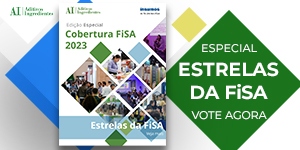The world’s largest chemical producer BASF and arc-net are joining forces to use blockchain technology for livestock sustainability. The system captures data to provide an environmental footprint with full transparency and traceability along the entire value chain. The partnership is just the latest example of how the food industry can harness the power of blockchain technology.
In the future, this project will help consumers make informed choices about the meat they eat via an on-pack unique scannable code, providing information on the product’s provenance and environmental footprint.
Headquartered in Belfast, Northern Ireland, arc-net is a technology company utilizing blockchain technology to provide transparency in the agri-food industry. The company works with industry stakeholders to help leverage value from transparency and traceability in their supply systems.
As part of this collaboration, BASF will use its tailored calculation tool, AgBalance Livestock to provide science-based information on environmental impacts along the animal production value chain.
Using such pioneering technology comes at a time when there is increasing global pressure to reduce emissions from the agricultural and livestock sectors. At the same time, global consumers and regulators all over the world are becoming more focused on setting defined sustainability criteria.
By joining forces, BASF and arc-net are supporting the animal production value chain in meeting these demands.
BASF’s calculation tool AgBalance Livestock
BASF’s calculation tool AgBalance Livestock considers the life cycle impact of all inputs and outputs of animal protein production, i.e., from feedstuffs and feed production, to animal farming and manure management, to the slaughter.
By combining this tool with arc-net’s blockchain technology, valuable sustainability information and verifiable data on the provenance of meat, milk and egg can be generated.
The preliminary phase of the pilot project will focus on collecting data for evaluating sustainability measures within a controlled setting at the farm level. In parallel, automated farm-level data capture and environmental output calculation will be combined via blockchain technology.
This information will provide environmental footprint along with full transparency and traceability along the entire value chain.
“Venturing into this collaboration with arc-net is a key milestone in our efforts to enable our customers to grow sustainably,” said Alexa Beaver, Digital Innovation, BASF. “We never stop thinking about what more we can do to create valuable sustainable measures, and this project is a great step forward.”
Kieran Kelly, CEO of arc-net, adds how the pilot aims to show how this application of the arc-net Blockchain and AgBalance Livestock tool can support a connected community to increase collaboration and provide valuable insights on how environmental impacts can be mitigated across the livestock sector.
“Working with BASF to promote sustainability and innovation to deliver better outcomes is extremely exciting and arc-net is looking forward to helping BASF and its customers achieve their goals and objectives worldwide.”
The BASF and arc-net collaboration is one example of how cutting-edge companies in are looking to get ahead of the curve are forming partnerships in this burgeoning technology invented a decade ago by Satoshi Nakamoto – the name used by the unknown person or people who designed bitcoin and created its original reference implementation – for use in the cryptocurrency bitcoin.
Other examples of early adopters of blockchain technology for use in food safety and contamination, as well as to address sustainability and traceability, including Walmart, Nestlé, Unilever and Dole. These companies, alongside the likes of Driscoll’s, Golden State Foods, Kroger, McCormick and Company, McLane Company, Tyson Foods, are part of a consortium that joined IBM last year intending to further strengthen consumer confidence in the global food system.
Sustainable Solution Steering methodology
Meanwhile, BASF is also helping customers assess their portfolio with its Sustainable Solution Steering methodology.
As sustainability is an integral part of BASF’s corporate strategy, the Sustainable Solution Steering method has been developed to assess and steer BASF’s product portfolio based on defined sustainability criteria.
It considers the entire value chain and markets including industry- and region-specific views. The approach reflects economic, ecological and social aspects of the products and solutions in their respective application and the company is now publishing the detailed method to enable customers and other interested parties to steer their portfolio according to their sustainability targets.
Some early adopters are already using the Sustainable Solution Steering method to analyze and steer their portfolios. BioMar, a leading supplier of high-performance aquaculture feed for farms around the world, applies BASF’s methodology to its raw material and ingredient supply side.
“BioMar strives to be the sustainability leader in the industry and this method supports us with a comprehensive and systematic tool that grants transparency and documentation from raw material to the end-product application,” said Vidar Gundersen, Global Sustainability Director, BioMar.
The Sustainable Solution Steering supports BioMar’s sustainability targets: It helps to foster the use of more sustainable raw materials in feed recipes, thereby promoting more sustainably produced aquaculture and seafood.
Initially developed by BASF for its use as a chemical company, the methodology was adapted for the aquaculture feed industry by consulting company, think step.
“Thinkstep has been supporting companies in various industries to customize and implement this approach – using a combination of consultancy, sustainability data and software tools,” said Martijn Gipmans, Principal Consultant and chemical sector lead at think step.
“Clients value BASF’s Sustainable Solution Steering method because it systematically reveals risks and opportunities along the entire value chain and enables the strategic steering of a product portfolio towards greater sustainability and revenue growth.”
BASF has applied the method to analyze, assess and steer its portfolio since 2012.
“Our experience with Sustainable Solution Steering shows that it is a very effective tool to actively improve our portfolio towards solutions which make a larger contribution to sustainability,” adds Dirk Voeste, Vice President Sustainability Strategy at BASF.
“The method helps us achieve the ambitious sustainability targets we have set ourselves and supports our customers with unique sustainability solutions.”
